Feature
‘God Is with Us in Suffering’
Lutherans in Brazil and Chile care for each other and their communities in the midst of devastating disasters.
A handful of women in hairnets bustle about a white-tiled kitchen. Their banter and laughter bounce off the walls. They could be a women’s group in the United States preparing for a potluck — except for the fact that they are speaking Portuguese.
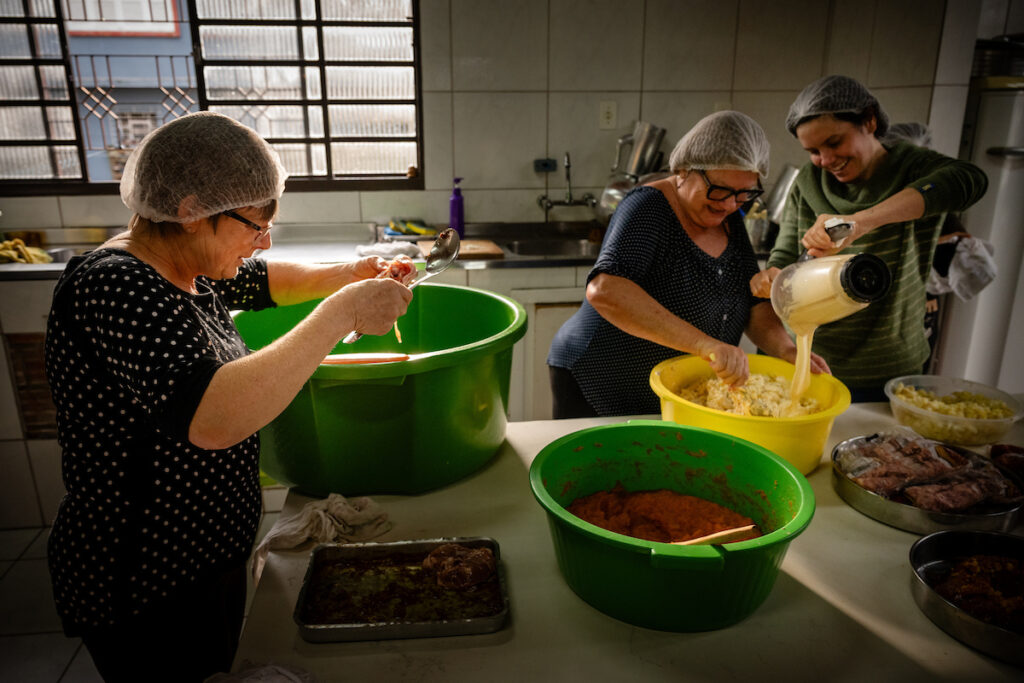


The camaraderie described above formed among a few women from the community and the people of St. John the Baptist Lutheran Church in Guaíba, Brazil, as they worked together to care for others in the midst of historic flooding in Porto Alegre and the surrounding regions.
Starting April 29 and lasting through May, floodwaters set new records in Brazil. Guaíba Lake rose 17.4 feet, exceeding the previous record of 15.6 feet set during the floods of 1941.
The 2024 flooding displaced an estimated 580,000 people, of which 380,000 were still displaced as of July 14. At last count, 181 Brazilians lost their lives, and around 60 remain unaccounted for.
Many people lost everything in their homes: clothing, food, furniture, heirlooms. Nothing remained except — perhaps — the shell of a home to return to, sometimes weeks later. In higher elevations, water rushed through cities, leaving trees piled on top of houses.
The area is also home to the largest Lutheran population in Brazil. More than 2,200 Lutheran families had their homes flooded, 16 Lutheran churches dealt with water in their buildings, and eight Lutherans lost their lives.
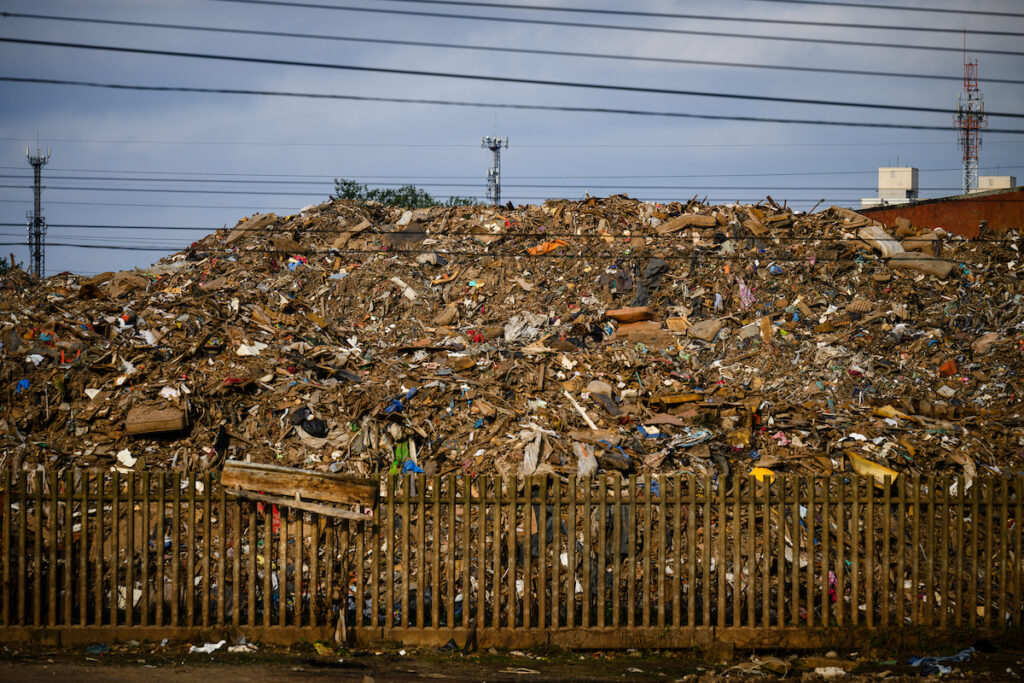
Helping Victims and Volunteers in Brazil
Into this disaster stepped the Evangelical Lutheran Church of Brazil (IELB), a partner church of The Lutheran Church—Missouri Synod (LCMS), to help both those in need and the volunteers aiding in the recovery.
The Rev. Ademir Stahl, pastor of St. John the Baptist Lutheran Church, said that at peak production the congregation made 1,000 meals a day for volunteers and victims. In total, members and others made and distributed 30,000 meals to support the recovery efforts.
“Disaster response is easy for the IELB because Lutherans like to make food,” Stahl said. “The church might be small, but the fellowship space is big.”
But the congregation offered more than just food: At one point, 25 flood victims were staying in the church’s various buildings. St. John the Baptist also received so many donations of food and clothing that the pile reached to the fellowship hall ceiling, and members had to store some items beneath the pews in the sanctuary.
“Part of what makes this flood so devastating,” said the Rev. Dr. Ross Johnson, director of LCMS Disaster Response, “is how long it took for the floodwaters to recede.”
The Rev. Vitor Valadao and his wife, Valentina, reported that the floodwaters reached to the rafters of St. John Lutheran Church in Canoas. And these floodwaters remained for three weeks.
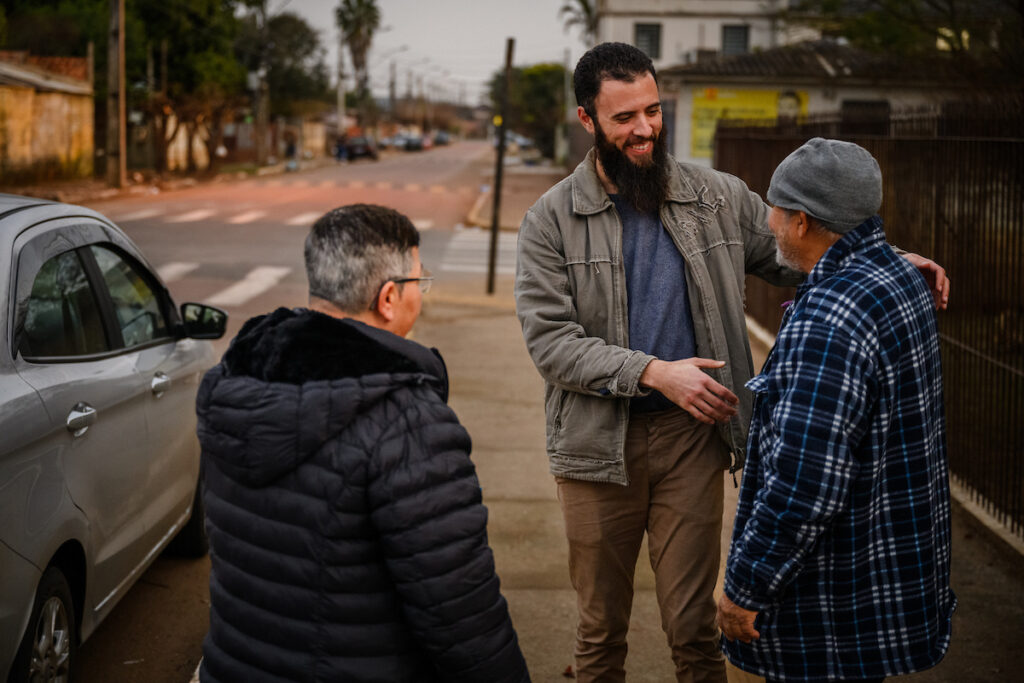
Nearly 85% of the homes of St. John’s members were flooded, including the Valadaos’ home. The Valadaos have moved several times since the original flooding, only recently starting the process to buy another home.
Despite the damage to their homes and congregation, members of St. John — and all of the other IELB congregations damaged by the flood — are still helping others. They haven’t finished restoring St. John’s sanctuary and fellowship hall, yet they immediately set up a distribution center for food and clothing. Vitor Valadao said, “It is our goal to make the church a reference point in the community to distribute what we have.”
Those involved acknowledge God’s work in making this possible: “Only the faith of God gives us strength in the morning to help other people; only God can do this for us,” said Astor DaSilva, who serves as a district mercy coordinator for the IELB.
DaSilva’s own home was washed away by the flood. With financial assistance from the IELB, he purchased a shipping container to use as a new home.
Prepared to Care for Others
Over a decade ago, the Rev. Airton Schroeder, now vice-president of the IELB, began studying how to respond in a disaster. “In Brazil, you don’t have a network of disaster responders,” Johnson noted. “He’s been laying a foundation and making the IELB aware of the need [for disaster responders].”
Schroeder’s ongoing work proved vital. “Literally the week before this massive historic flood,” Johnson noted, “we had a major training event at the seminary.”





The training prepared pastors, leaders and lay members to help in a disaster and explained how and why Lutherans show mercy. When the flooding occurred, attendees were able to immediately put what they had learned into practice and gain a reputation as a trusted mercy organization.
For example, a furniture company owner heard about the work of the IELB in helping with the disaster, and he donated enough modular furniture for 58 families. Numerous stories exist about donations coming into the IELB from other churches and organizations.
“Before I [could] speak with the pastors and congregations, all were working [to help],” Schroeder said.
During a July visit to Christ Congregation in Três Coroas, Johnson summarized how the IELB has responded to this crisis: “It’s amazing to see your church body come together from across the country, that when one church … is in need, [other churches] come together not just in prayers, but also in support of one another.”
Johnson is working closely with Schroeder and the IELB to see how the LCMS can walk alongside and help them extend their work to care for those in need from the flooding.
This work is already bearing fruit. “You see in the Divine Service … yesterday how many visitors [there were]. This is new to the church,” Schroeder said. “A lot of people that don’t know about the Lutheran church see the church in this disaster. I think God opened doors to mission and to evangelism and to care for people. He has a salvation plan in this disaster.”
‘Like the End of the World’ in Chile
On the other side of the continent, people were dealing with another historic — although no less deadly — problem: wildfires that ravaged the hills surrounding the cities of Viña del Mar and Valparaíso. The February wildfires were the worst in Chile’s history.
“When the fire began, … I was [finishing] handwriting my sermon for Sunday. Suddenly I noticed that there was no electricity, so I couldn’t see what I was writing,” said the Rev. Marcelo Rivas, a pastor in the Confessional Lutheran Church of Chile (ILC-Chile).
Rivas tried calling his wife, but the call didn’t go through. Then he tried to take the bus home, but the city was “in total chaos,” Rivas continued. As he walked home, “all the sky was gray and snowing ashes. [It was] like the end of the world.”
Thankfully, Rivas made it home safely to his wife and family. But ash continued to fall over Viña del Mar, and thick smoke hung in the air for days.
Approximately 12,000 homes were destroyed by the fires, and over a hundred people died. The ILC-Chile, another partner church of the LCMS, was directly affected by the wildfires. Though none of the ILC-Chile’s church and school properties were damaged, every church member had neighbors or family members who died or were injured, or whose homes were destroyed.





Even after evacuating his own home, the Rev. Juan Pablo Lanterna, ILC-Chile president, drove back up into the hills around Valparaíso, with the fires blazing all around him, to bring people down in his own car.
Once the fires had subsided, Lanterna continued to drive up into the burned-out areas. Though police cordoned off these areas to civilians, they let Lanterna through when they saw his clerical collar and crucifix. There he prayed with people and shared the comfort of the Gospel with them.
Lanterna said he knew he could die when he went up into the hills. “It [might] seem like God wasn’t present in these situations, but He certainly was. He’s always present to us in His Word in any situation [in which] we may find ourselves.”
A Long-Term Recovery Effort
Now, months after the fires, rebuilding efforts are underway. Though blackened house frames and melted cars can still be seen all over the hillsides, new growth on trees is starting to appear, and fresh plywood walls give shape to houses once more. To replace street signs and house numbers, residents began flying Chilean flags with their address and family name written on them in black marker.
A couple of weeks after the fire, Johnson and the Rev. Ted Krey, director of the LCMS Latin America and the Caribbean region, traveled to Chile to do damage assessment and formulate a response plan, which will be carried out over the course of 2024 and 2025.
So far, Disaster Response has purchased a minivan for transportation and food delivery, supported 50 families with emergency medical supplies, and supplied 100 families with construction materials for rebuilding homes.
The mercy center in Valparaíso, which Disaster Response built after an earthquake in 2010, has been turned into a medical clinic, used by local doctors, dentists and other medical professionals, since the hospital nearby burned down.
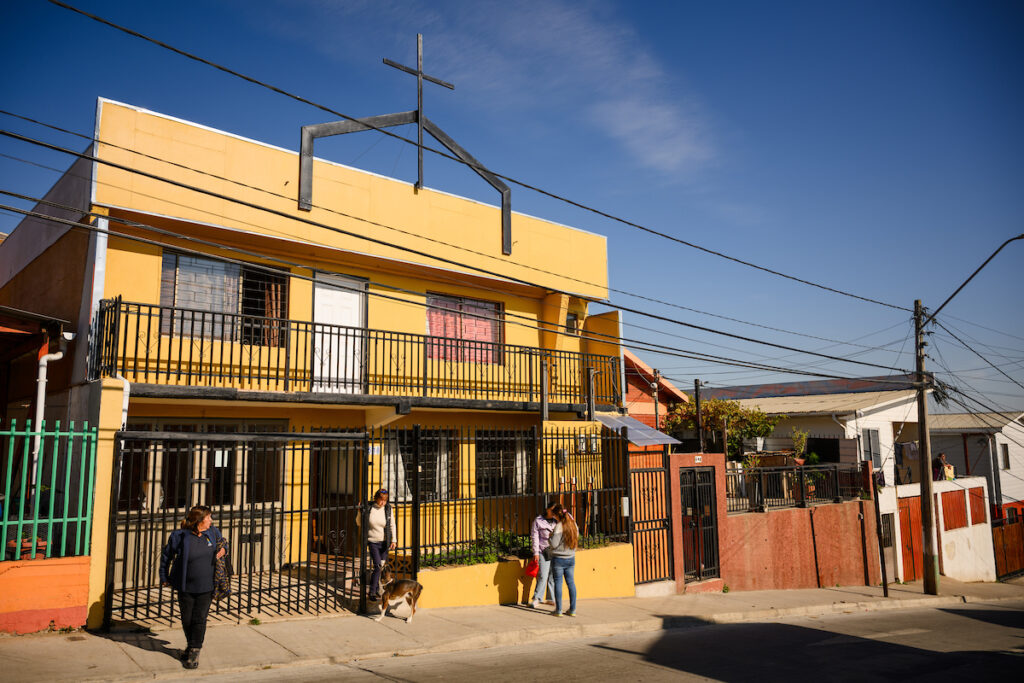
The plan also made it possible for students from the Brazilian, Argentinian and Dominican seminaries to travel to Chile on short-term teams to assist with building projects and learn about mercy work.
“We’re teaching them about the theology of the cross, about disaster response, sending them through our [Lutheran Early Response Team] training. … As part of their formation, they’re also doing the hands-on work,” Johnson said.
Disaster Response training helps these seminarians care for people who are going through a tragedy, both by praying with them and providing pastoral care and by performing tangible works of mercy like rebuilding the foundations of their homes.
Finally, the plan ensured that both victims and church workers would have adequate spiritual care in the coming year. Together with the LCMS Recognized Service Organization DOXOLOGY: The Lutheran Center for Spiritual Care and Counsel, Disaster Response organized a church worker wellness conference for Chilean pastors and their families this past summer. Another one will be held next year on the anniversary of the wildfires.
The ILC-Chile also called a full-time pastor, the Rev. Franco Kevin, to devote his work to caring for wildfire victims and being a constant presence in the disaster area for the next year, so that evangelism and spiritual care may continue to take place alongside mercy work.
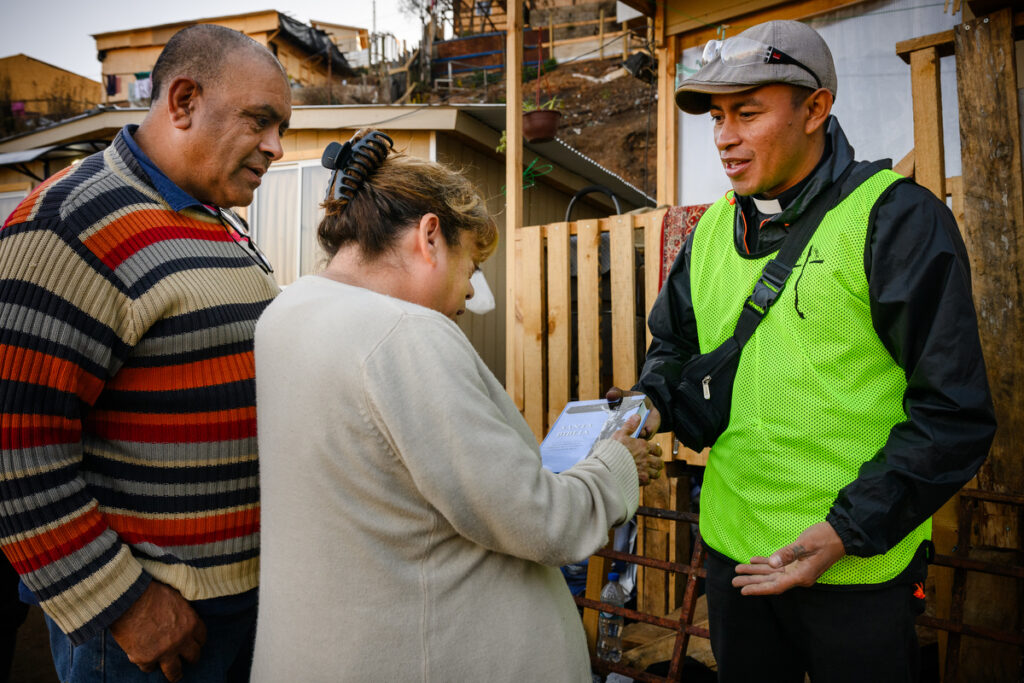
Finding Comfort in God’s Word
In the early days after the fire, Rivas said it was difficult to find words of comfort — he knew he couldn’t simply tell victims “that everything was going to be OK … because we live in a reality of sin and weakness.”
“Finally I realized that on my own, I don’t have anything good to say to anybody. It’s better to take your Bible and read the words of God. … It was really complicated thinking through what I had to say … [but] I realized I don’t want to say [anything] in my own words. … And I could say to [the victims], ‘Through the Word of God, you are not alone.’”
Chilean pastors have been tireless in providing pastoral care to all who need it after the fire. The Spanish version of the Pastoral Care Companion is an essential tool for administering the Word of God to victims.
“[The Pastoral Care Companion] is really helpful because sometimes we go to the places and we are just shocked with what the people say,” said the Rev. Pablo Gonzalez, who serves in Santiago, Chile. “So we talk about reading the Scripture and telling them how … God is with us in suffering. For example … when the apostle Paul says ‘for me, to live is Christ’ in English — ‘para mi, el vivir es Cristo’ — whether we live or we die, we belong to Him.”
“The Lutheran response is constant,” continued Gonzalez. “And of course, we have the Gospel of Jesus … and that’s our special help. That’s why we pray with [victims] and encourage them to look at their sufferings in the light of Christ. … He is here with us through [His] suffering … on the cross. He takes our suffering as His own. Our work is to get people to see how God is with them.”
Learn More
- Learn more about LCMS Disaster Response
- Make a gift to support LCMS Disaster Response
Pray with Us
Turn, O Lord, and deliver those who suffer in disaster for the sake of Your steadfast love. Amen. (See Psalm 6:4.)
Share Jesus with the World
Your generosity today makes possible your Synod’s witness and mercy efforts both at home and abroad.
Are you looking to direct your gifts for work that’s more specific?
Visit the LCMS online ministry and mission catalog to find those opportunities most meaningful to you!
Don’t see what you’re looking for?
Contact LCMS Mission Advancement at 888-930-4438 or mission.advancement@lcms.org to talk about all the options available.
Rev. Roy S. Askins
Managing director of Editorial and Theological Content for LCMS Communications and executive editor of The Lutheran Witness.

